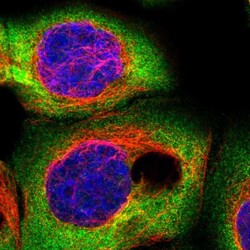Antibody data
- Antibody Data
- Antigen structure
- References [5]
- Comments [0]
- Validations
- Immunocytochemistry [1]
Submit
Validation data
Reference
Comment
Report error
- Product number
- HPA018846 - Provider product page

- Provider
- Atlas Antibodies
- Proper citation
- Atlas Antibodies Cat#HPA018846, RRID:AB_1847266
- Product name
- Anti-CSDE1
- Antibody type
- Polyclonal
- Description
- Polyclonal Antibody against Human CSDE1, Gene description: cold shock domain containing E1, RNA-binding, Alternative Gene Names: D1S155E, UNR, Validated applications: ICC, IHC, WB, Uniprot ID: O75534, Storage: Store at +4°C for short term storage. Long time storage is recommended at -20°C.
- Reactivity
- Human
- Host
- Rabbit
- Conjugate
- Unconjugated
- Isotype
- IgG
- Vial size
- 100 µl
- Concentration
- 0.4 mg/ml
- Storage
- Store at +4°C for short term storage. Long time storage is recommended at -20°C.
- Handling
- The antibody solution should be gently mixed before use.
Submitted references The RNA-binding protein CSDE1 promotes hematopoietic stem and progenitor cell generation via translational control of Wnt signaling
A critical region of A20 unveiled by missense TNFAIP3 variations that lead to autoinflammation
The CDT of Helicobacter hepaticus induces pro-survival autophagy and nucleoplasmic reticulum formation concentrating the RNA binding proteins UNR/CSDE1 and P62/SQSTM1
Disruptive variants of CSDE1 associate with autism and interfere with neuronal development and synaptic transmission
Cytolethal distending toxin induces the formation of transient messenger-rich ribonucleoprotein nuclear invaginations in surviving cells
Li Y, Li C, Liu M, Liu S, Liu F, Wang L
Development 2023;150(21)
Development 2023;150(21)
A critical region of A20 unveiled by missense TNFAIP3 variations that lead to autoinflammation
El Khouri E, Diab F, Louvrier C, Assrawi E, Daskalopoulou A, Nguyen A, Piterboth W, Deshayes S, Desdoits A, Copin B, Dastot Le Moal F, Karabina S, Amselem S, Aouba A, Giurgea I
eLife 2023;12
eLife 2023;12
The CDT of Helicobacter hepaticus induces pro-survival autophagy and nucleoplasmic reticulum formation concentrating the RNA binding proteins UNR/CSDE1 and P62/SQSTM1
Backert S, He W, Azzi-Martin L, Velasco V, Lehours P, Dubus P, Djavaheri-Mergny M, Ménard A
PLOS Pathogens 2021;17(3):e1009320
PLOS Pathogens 2021;17(3):e1009320
Disruptive variants of CSDE1 associate with autism and interfere with neuronal development and synaptic transmission
Guo H, Li Y, Shen L, Wang T, Jia X, Liu L, Xu T, Ou M, Hoekzema K, Wu H, Gillentine M, Liu C, Ni H, Peng P, Zhao R, Zhang Y, Phornphutkul C, Stegmann A, Prada C, Hopkin R, Shieh J, McWalter K, Monaghan K, van Hasselt P, van Gassen K, Bai T, Long M, Han L, Quan Y, Chen M, Zhang Y, Li K, Zhang Q, Tan J, Zhu T, Liu Y, Pang N, Peng J, Scott D, Lalani S, Azamian M, Mancini G, Adams D, Kvarnung M, Lindstrand A, Nordgren A, Pevsner J, Osei-Owusu I, Romano C, Calabrese G, Galesi O, Gecz J, Haan E, Ranells J, Racobaldo M, Nordenskjold M, Madan-Khetarpal S, Sebastian J, Ball S, Zou X, Zhao J, Hu Z, Xia F, Liu P, Rosenfeld J, de Vries B, Bernier R, Xu Z, Li H, Xie W, Hufnagel R, Eichler E, Xia K
Science Advances 2019;5(9)
Science Advances 2019;5(9)
Cytolethal distending toxin induces the formation of transient messenger-rich ribonucleoprotein nuclear invaginations in surviving cells
Blanke S, Azzi-Martin L, He W, Péré-Védrenne C, Korolik V, Alix C, Prochazkova-Carlotti M, Morel J, Le Roux-Goglin E, Lehours P, Djavaheri-Mergny M, Grosset C, Varon C, Dubus P, Ménard A
PLOS Pathogens 2019;15(9):e1007921
PLOS Pathogens 2019;15(9):e1007921
No comments: Submit comment
Supportive validation
- Submitted by
- Atlas Antibodies (provider)
- Main image

- Experimental details
- Immunofluorescent staining of human cell line A-431 shows positivity in cytoplasm.
- Sample type
- Human
 Explore
Explore Validate
Validate Learn
Learn Western blot
Western blot Immunocytochemistry
Immunocytochemistry